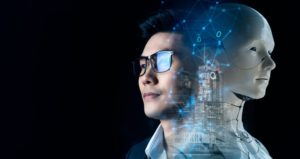(metamorworks/Shutterstock)
As artificial intelligence (AI) technologies and automation evolve, the way we work is changing faster than ever. Traditional jobs are being redefined, and our growing dependence on technology is altering how we tackle tasks in many industries. Alongside the challenges of an aging population, these shifts are creating a significant transformation in the U.S. workforce.
To help understand how these changes will impact the job market, Pearson, a global education and learning company, unveiled the Skills Map of the United States – an in-depth analysis of the American job market through 2028.
The report projects that the American workforce will add 1.9 million new jobs through 2028. This includes approximately 11.25 million jobs from economic growth, 1.87 million related to technology implementation and maintenance, and a reduction of about 11.2 million roles due to technology automation and augmentation.
Pearson’s report utilizes the company’s advanced predictive analytics and proprietary Skills Outlook data collected from over 85 million U.S. job advertisements and labor market information. With this report, Pearson aims to provide critical insights to policymakers, businesses, and individuals prepare for the future of work.
One of the key findings of the report is that technology is not only transforming existing roles but also generating new opportunities across all sectors, challenging our definition of a tech job. As technology becomes more central to operations, all jobs will become tech jobs in one way or the other.
Financial analysts would utilize AI algorithms to forecast market trends, nurses would use on-site data analytics for patient care, manufacturing experts would use AI for 3-D printing and robotics, and educators would need AI skills to provide personalized learning experiences. Many of these professions are already incorporating AI into their work.
Pearson recommends that organizations should focus on upskilling their workforce and that workers must commit to lifelong learning to remain competitive in an evolving job landscape. Educators can design courses and training initiatives that combine technical abilities with soft skills. The report also recommends that policymakers should support such upskilling and learning initiatives, particularly in industries facing automation.
“The key message is that technology is transforming jobs at a faster pace than ever before, “ stated Dave Treat, Chief Technology Officer, Pearson. “Every job, from nursing to manufacturing, is becoming more tech-focused, increasing the demand for workers who can blend technical expertise with industry-specific skills.
“As technology evolves, it’s opening new opportunities across all sectors, helping businesses tackle real-world challenges more effectively. Our Skills Map provides the data and insights needed to help workers and businesses understand these changes, and our lifelong learning solutions help people thrive in an ever-evolving workforce.”
According to Pearson, healthcare, education, and manufacturing, will remain top employers in 2028, though all sectors will evolve with advances in technology. Driven by increasing chronic conditions and an aging population, Pearson projects an addition of 782,810 workers to the over 20 million healthcare workforce by 2028.
The report emphasizes the crucial role AI will play in healthcare, particularly in reducing the time spent on tasks such as maintaining medical records, staying current in areas of expertise, and developing educational programs and procedures.
Pearson’s research also indicates that GenAI has the potential to save nearly 78 million work hours per week across the U.S. workforce, enabling healthcare professionals to focus more on critical hands-on tasks or patient care that cannot be automated or performed by AI.
“AI and technology have the power to transform clinician capabilities, improve diagnostics, and help deliver personalized treatments,” shared Art Valentine, President, Pearson Assessment and Qualifications. “To fully realize this potential, effective assessment and qualification will be essential for ensuring competency and fostering trust between practitioners and patients.”
While the Skills Map of the United States reveals a clear demand for tech skills, it also highlights the equal importance of human-centric skills. Pearson anticipates that organizations prioritizing personalized training and continuous learning will be well-positioned to harness the benefits of both technology and human talent.
The in-demand skills for workers are those rooted in human qualities such as creativity, physical dexterity, and empathy. However, upskilling and reskilling are critical to prepare workers for the future.
We can expect technology to evolve rapidly between now and 2028. impacting all facets of life and work. Pearson’s research provides a realistic perspective on the future and shares valuable insights into how to prepare for it. The report also underscores the need for further research into the critical factors reshaping employment.
Related Items
KPMG Survey Reveals Strategic Shifts in AI Strategies in 2024
The Demand for AI/ML Skills Is Growing
Gartner: GenAI Will Require 80% of Engineering Workforce to Upskill Through 2027
Source link
lol



